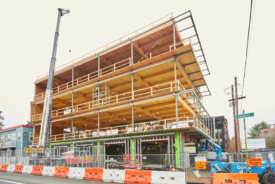Beyond Parking Mandates
Data and Insights on the Growing Movement to Break Free from Parking Mandates
For decades, little-known rules in local zoning codes have been reshaping cities around cars. Requirements that every new home or business have a pre-determined number of parking spaces have inflated housing costs, killed small businesses, and made our most charming and historic Main Streets illegal to build today. Many of those mandatory parking spaces hardly even get used.
That’s why policymakers across Cascadia are leading the way to erase these outdated rules, restoring the rights of property owners and allowing towns to gradually become more walkable over the years. Parking reform has spread across the snowy suburbs of Anchorage, Alaska to the halls of Oregon’s capitol where policymakers adopted state-level prohibitions of parking mandates in 2022.
Sightline’s new series picks up where Parking? Lots! left off a decade ago: reporting on the surging bipartisan movement to roll back parking mandates, and sharing new data and insights from jurisdictions that have already made this policy change.
New to parking minimums? Our friends at Strong Towns included our reporting on Fayetteville’s parking reform in its excellent explainer video:
for Policymakers
2023 Statewide Legislation
 Proposals from across the US to reduce overbuilt parking lots
Proposals from across the US to reduce overbuilt parking lots
Podcasts
Research and Analysis
How Parking Ratios Kill Homes
A string of mistakes in one city shows how easily local rules can turn arbitrary and destructive.
With Flexibility Over Parking, Oregon Homebuilders Get to Work
Tens of thousands of homes are now more buildable, including several projects now resurrected that local parking mandates had previously killed.
One in Three Garages Has No Car in It
You can build it, but they won’t park there.
No Minimum Parking Requirements? No Problem for Fayetteville, Arkansas
Six years into its deregulation experiment, a growing city thrives without parking mandates.
Parking Reform Legalized Most of the New Homes in Buffalo and Seattle
Studies from two very different cities showed the same result.
Anchorage Assembly Unites to End Parking Mandates
Progressives and conservatives find common ground on easing regulations on housing and business development.
To Stop Building Heat Islands, Stop Overbuilding Parking Lots
Parking lots amplify high temperatures. Why are we still requiring them to be larger than they need to be?
Get monthly updates from our Housing + Urbanism team, including the latest parking reform research
 Follow Catie Gould, Senior Transportation Researcher, at @Citizen_Cate
Follow Catie Gould, Senior Transportation Researcher, at @Citizen_Cate
 Follow Michael Andersen, Senior Housing Researcher and Transportation Lead, at @andersem
Follow Michael Andersen, Senior Housing Researcher and Transportation Lead, at @andersem
In summer 2022, both Oregon and California took statewide action to roll back minimum off-street parking requirements, relegalizing homes and businesses regardless of how many parking spots they have. Catie Gould and Jeannette Lee present to Portland State University’s Transportation Research and Education Center on why parking reform is so important, what to expect next in Oregon, and lessons from cities like Anchorage, Alaska, that have already gone all the way to delete this regulation from their zoning code.
Slides from the discussion available here.









 Follow Catie Gould, Senior Transportation Researcher, at
Follow Catie Gould, Senior Transportation Researcher, at 